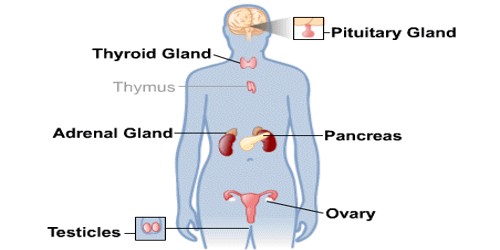The endocrine system is made up of glands that make hormones. This system includes those organs of the body which produce hormones. It helps to regulate metabolism, growth and development, tissue function and plays a part also in mood. This system influences almost every cell, organ, and function of our bodies. The field of medicine that deals with disorders of endocrine glands are endocrinology.
In physiology, the endocrine system is a system of glands, each of which secretes a type of hormone directly into the bloodstream to regulate the body. Endocrine glands release hormones into the bloodstream. This lets the hormones travel to cells in other parts of the body.
These control many different bodily functions, including: Respiration, Metabolism, Reproduction, Sensory perception, Movement, Sexual development, Growth, etc.
The endocrine system is in contrast to the exocrine system, which secretes its chemicals using ducts. The endocrine hormones help control mood, growth and development, the way our organs work, metabolism, and reproduction. The endocrine system is an information signal system like the nervous system, yet its effects and mechanism are different.
The Parts of the Endocrine System – hypothalamus, pituitary, thyroid, parathyroids, adrenals, pineal body, the ovaries, the testes, etc.
The endocrine system regulates how much of each hormone is released. The endocrine system’s effects are slow to start and long-lasting in their response. The nervous system sends information quickly, and responses are generally short-lived. Many things affect hormone levels, such as stress, infection, and changes in the balance of fluid and minerals in the blood. Hormones are complex chemicals released from endocrine tissue into the bloodstream where they travel to target tissues and trigger a response.
Features of endocrine glands are, in general, they have no ducts, they have a good blood supply, and usually, they have vacuoles or granules inside their cells, storing their hormones.
















